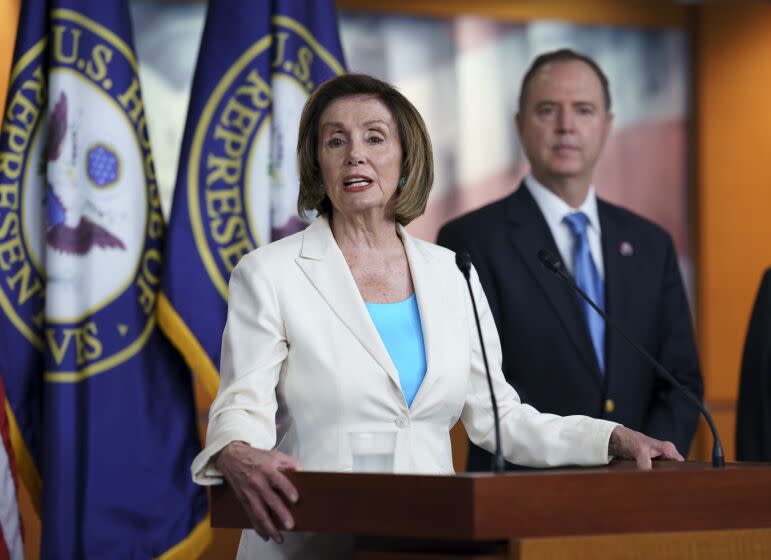Nicholas Goldberg: Hey Nancy Pelosi, stop emailing me already

- Oops!Something went wrong.Please try again later.
Somehow I thought that when the midterm elections were over, when Nov. 8 came and went, the barrage of political fundraising emails would stop.
Who was I kidding?
They kept on coming because in the modern era of permanent campaigns, spam, digital fundraising and general shamelessness, that’s just the way it is. There's no rest for the weary or the tapped out.
Not only did the emails not stop coming, they seemed to ratchet up from a previous level of frantic anxiety to a new plateau of panic and hysteria. Presumably, if they didn’t, you might shrug it off and fail to rush for your wallet and your Xanax.
“This is absolutely critical, Nick,” says one email I received from Nancy Pelosi. “I cannot overstate the severity of this situation.”
“Things have taken a dire turn," says another.
The fundraising pleas I get are mostly from the Democratic Congressional Campaign Committee and from a handful of politicians whose lists I've somehow fallen onto. They’re sent under the names of members of Congress such as Pelosi, Adam Schiff and Hakeem Jeffries, with cameos from Barack Obama, Joe Biden and others. If I choose to contribute, my money is routed through the digital donation platform ActBlue.
I’ve never signed up to be on their lists. I’ve never donated to the candidates in question.
But they keep trying.
“Nick, this is the single biggest announcement we have ever made.”
“We’re asking — no we’re downright begging you — to step up.”
"This is your last chance, Nick."
Yeah, right.
I’m supposed to be flattered, I guess, that these bigwigs are taking time to write to me personally, relying on the use of first names to sound chummy. “Adam suggested I get in touch with you,” wrote Stacey Abrams, when she was running for governor. “Nick, I’m disgusted,” wrote Pelosi. “I wanted to tell you personally.”
The calls to action are desperate: They’re “begging” for my help, they’re “pleading,” they’re “imploring.”
I’m supposed to be ashamed when they’re “disappointed” in me. As in, “Nick we’ve reached out 19 times… Now is not the time to ignore our emails, Nick.”
Actually, it was that last one that put me over the edge. I mean, if the week between Christmas and New Year's isn’t the time to ignore their emails, when is?
Answer: Never, of course.
I don’t know who writes this hyperbolic crap. Not Nancy, Hakeem or Barack, that’s for sure. But I guess it does the trick.
During the 2022 election cycle, more than 7.4 million unique donors gave 86 million contributions to 27,000 Democratic campaigns and progressive organizations totaling $3.5 billion through the ActBlue platform, the company says. Since 2004, it has raised $11.7 billion.
And why should that bother me? I’m generally sympathetic to Democrats. I know they need money to win their races.
Probably I should be grateful that ActBlue (and its counterpart WinRed, which offers similar services for Republicans) encourages small donations from ordinary voters to compete with the billionaires, unions and corporations that increasingly fund our elections.
But I'm bothered nevertheless by the glib clickbait of the endless solicitations. As former Rep. Steve Israel of New York noted: "Isn't democracy in enough trouble without reducing it to a speed date?"
Political spam has become too cheap and easy to send out. Billions of political messages are dispatched by the candidates' campaigns each year in email, text and robocalls. For us recipients, it’s none too easy to opt out. While commercial solicitations by email and text are subject to certain basic rules — they must have clear opt-out mechanisms and must identify who is sending the message, for instance — political email is less tightly regulated.
“The politicians who write the rules have exempted themselves from a lot of the rules that could apply,” Ellen Weintraub, a member of the Federal Election Commission, told the Washington Post. That was in October when Google was launching a pilot program to allow campaign emails to bypass the spam filters that protect Gmail users from junk mail.
How do you get on the radar of politicians who want your money? Their campaigns buy voter registration lists and trade databases with other groups. You’re selected not because you’ve expressed interest in donating but based on your data, such as party registration, income, age, debt level, history of donating, religion and whether you own a gun.
In 2021, four state attorneys general opened investigations into political fundraisers' use of prechecked boxes that signed people up automatically to pay recurring donations when they had only intended to contribute once. ActBlue (and WinRed) was investigated amid fraud allegations and refund demands; now it says it no longer uses prechecked boxes.
And, oh sure, you can click “Unsubscribe” if you can find the tiny link way down at the bottom. But actually getting off the list is another story. As ActBlue says: “In general, you can usually find an ‘Unsubscribe’ link at the end of most emails that should take you off of that specific email list.”
Have you ever read a sentence with more qualifiers?
Don't hold your breath. Nothing is more important than money to candidates. A week before the election, Open Secrets, which tracks money in politics, projected that all state and federal 2022 campaign spending would reach $16.7 billion. According to fivethirtyeight.com, more than 90% of House candidates who outspend their opponents win.
It’s a bad, broken, corrupt system in which money plays far too big a role.
And I’m tired of being barraged day in and day out by patronizing, cheesy solicitations. Nancy, Hakeem, Adam, Stacey, this is absolutely critical. I’m begging you to take me off your lists. I’m pleading. I’m imploring!
This story originally appeared in Los Angeles Times.

